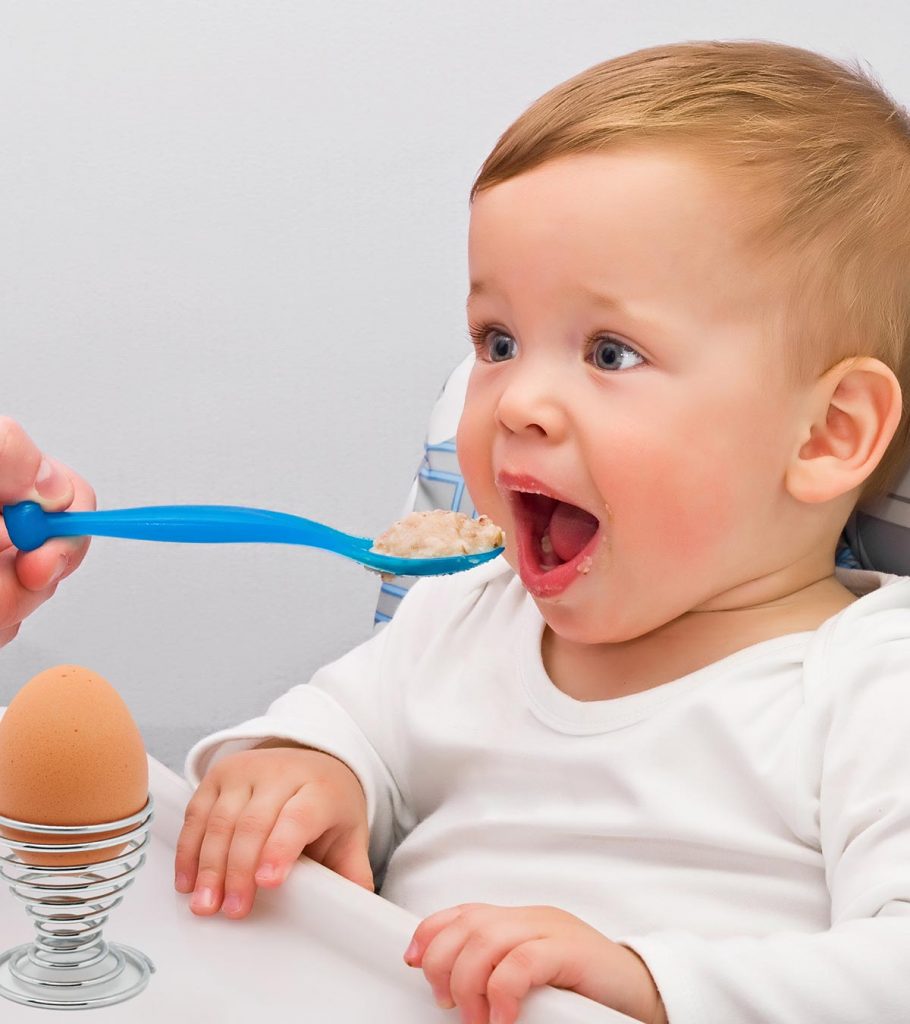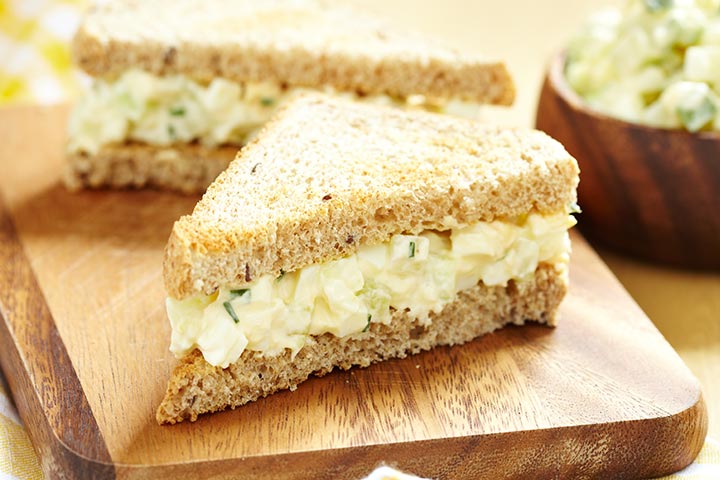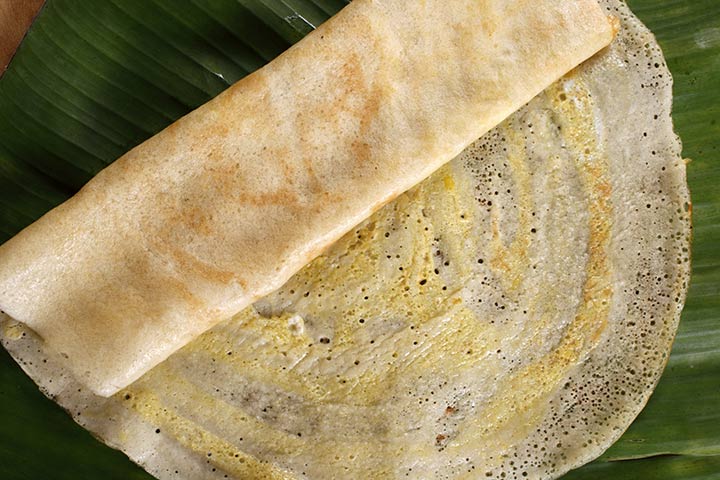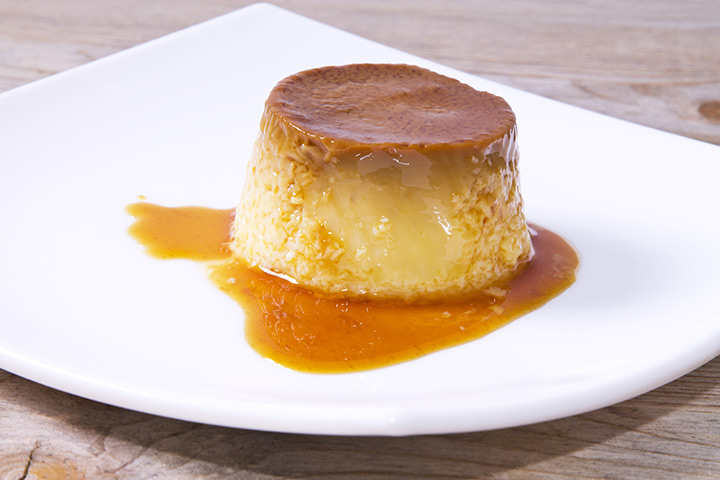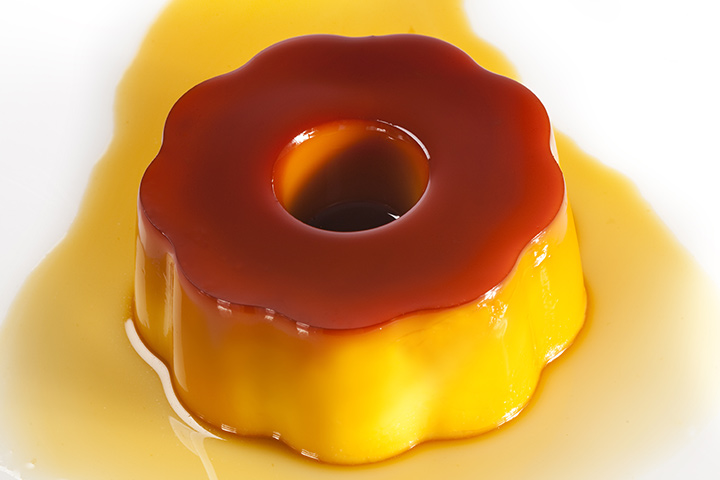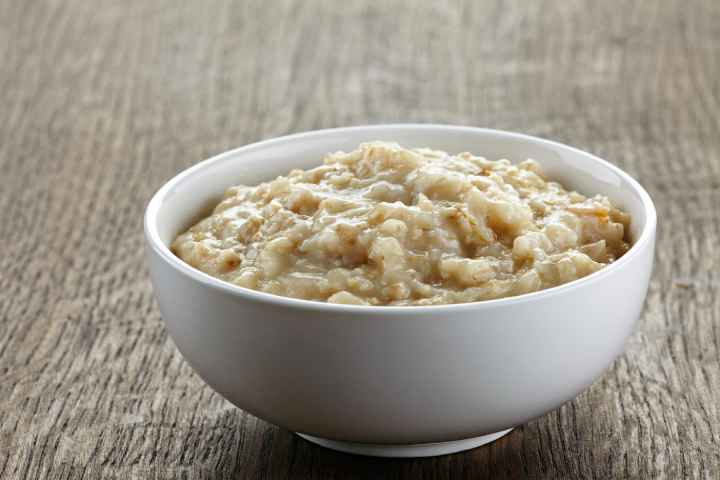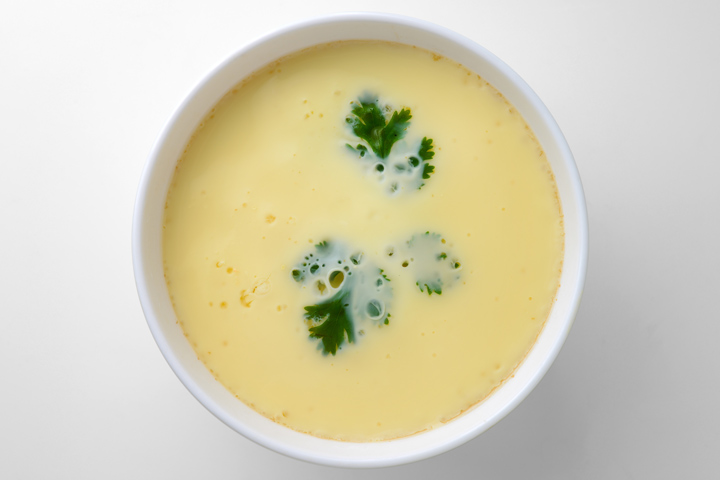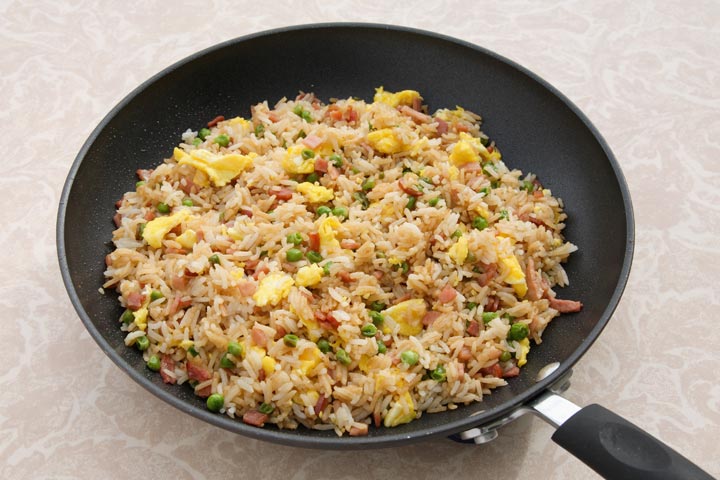It’s common for parents to speculate if eggs for babies are safe. Eggs are considered to be among the top nutritious foods that are rich in high-quality proteins such as lean proteiniXA protein source low in saturated fat. and 13 essential vitamins that can effectively support a baby’s growth and development. However, it is also one of the most common allergens (1) (2). So, is it safe for babies to eat eggs?
Understanding this is vital to ensure you introduce the egg to your baby at the right age and in the right portions and follow the dietary guidelines shared by your pediatrician. Read on as we tell you more about the possible health benefits of eggs for babies and their side effects. We also present some baby-friendly egg recipes you can try preparing at home.
When Can Babies Eat Eggs?
In the past, pediatricians recommended eggs only after the baby turned one to avoid any possible risk of allergy. A collaborative survey by US researchers revealed that about 15.5% of caregivers introduced eggs to their babies before seven months, and around 66.4% served eggs to their infants before they turned one. However, the revised recommendations of the American Academy of Pediatrics (AAP) suggest that you may include eggs as soon as the baby starts eating solids.
This is crucial as there is no evidence to suggest that waiting to introduce baby-safe, allergy-causing foods, such as eggs, beyond four to six months of age could prevent food allergy (3). It could also be selected as one of the first foods for baby provided you stay alert about the possible allergic reactions that egg consumption might trigger.
AAP further states that the introduction of cooked eggs at four to six months of age might protect against egg allergy, irrespective of family, or personal history of allergy (4).
Possible Risks Of Egg For Babies
The possible allergic reactions, which could be severe, are believed to be triggered by proteins found in the egg white. Though rare, egg yolk can trigger an allergy too (2). Studies show that by the age of 16, children usually outgrow egg allergies.
Watch for signs of allergies and sensitivities whenever you introduce eggs. If anyone in your family is allergic to eggs, consult a pediatrician before including egg in your baby’s diet.
Also, if your baby has eczemaiXAn inflammatory skin condition causing dryness, irritation, and itching., exercise caution while giving them eggs, as there is a relation between this skin condition and food allergies.
Age-specific prevalence of egg allergy is shown to be the highest between one to two years. However, fewer children are reported to meet convincing symptoms, and the final incidence of physician-confirmed allergy is even lesser, according to the graph. The prevalence of egg allergy is observed to decline with age, with the lowest number of affected children falling in the age group of 14 to 17 years.
Age-specific prevalence of egg allergy
Source: Egg Allergy In US Chuldren; The Journal of Allergy and Clinical Immunology: In Practice [(Category of egg allergy),((14).[/mj_protip]
Signs Of Egg Allergy Or Sensitivity
Symptoms of egg allergy could range from mild allergic reactions to anaphylaxis. The common symptoms that you should check in case of an egg allergy are (2):
- Vomiting
- Stomach cramps
- Indigestion
- Diarrhea
- Wheezing
- Repetitive cough
- Tightness in throat, hoarse voice
- Hives
A more severe allergy could show the following symptoms and warrant an emergency medical intervention.
- Shortness of breath, difficulty breathing
- Weak pulse
- Pale or blue coloring of the skin
- Swelling, can affect the tongue and/or lips
- Dizziness
- Confusion
The extent of severity of the allergy depends on the baby’s immune system, and a severe form of an allergic reaction such as anaphylaxisiXSevere, generalized allergic reaction. is seldom seen in babies.
Nutritional Value Of Egg
Below is the nutritional value of a whole, raw egg.
| Name | Amount |
|---|---|
| Protein | 12.56g |
| Total lipid (fat) | 9.51g |
| Calcium, Ca | 56mg |
| Iron, Fe | 1.75mg |
| Zinc, Zn | 1.29mg |
| Selenium, Se | 30.7µg |
| Folate, total | 47µg |
| Choline, total | 293.8mg |
| Vitamin A, RAE | 160µg |
| Lutein + zeaxanthin | 503µg |
| Cholesterol | 372mg |
Source: USFDA (5)
Benefits Of Eggs For Babies
Eggs can be considered to be one of the best iron-rich foods for little ones. Egg contains proteins, fat, and other nutrients such as iron, zinc, copper, selenium, calcium, fatty acids, vitamins D, B12, E, choline, and folate (5). Eggs have the second highest-quality protein found in any food, the first being human milk that has lactalbuminiXA protein obtained from whey. protein. Furthermore, eggs are among the nutrient-dense foods, which babies can start consuming from the weaning stage. You can include eggs in their diet when they are starting solids.
Here is how eggs can benefit your baby in more than one way:
- Eggs contain high-quality proteins that support the growth and development of babies (6).
- Minerals such as zinc, iron, calcium, magnesium, and selenium found in the egg aids in boosting immunity and maintaining many body functions such as overall growth by cell production and metabolism (7) (8).
- The cholesterol and choline present in egg yolk contribute to brain development and hormone production (1).
- Fat-soluble vitamins in eggs, such as vitamins D, A, E, and K, aid in the development of the strong and sturdy bone structure, metabolism, and red blood cell production (1).
- Egg yolks are rich in antioxidants such as lutein and zeaxanthin, which support eye functioning and vision at large (1).
Trivia: Egg whites contain more than half (four of the six grams) of an egg’s protein. They are low in calories and free of carbohydrates and fats. However, both the egg white and yolk are highly nutritious.
Interestingly, the hens who are fed flaxseed lay organic eggs with high omega-3 fatty acids concentration, whereas hens fed canola oil lay organic eggs with high omega-6 fatty acids concentration.
How To Introduce Eggs To Babies?
Introduce one food at a time. This would help watch probable reactions that a food could cause. So follow a three to five-day wait rule (9). If you notice any allergic reaction or sensitivity during these days, contact your baby’s pediatrician or an allergist.
However, to prevent allergic reactions to egg, you can try one trick. Introduce egg yolk before egg white, as egg yolks are considered to be less allergenic than egg whites. You can do so in the following ways:
- To start simple, take the yolk out from a hard-boiled egg. Add breast milk or formula milk to it and mix everything. Serve it to your baby as egg yolk puree.
- Another way is egg yolk omelet. To prepare, separate the yolk from a raw egg, beat it well. Meanwhile, heat a frying pan with some oil. Spread the beaten yolk on the pan and cook from both sides until golden brown. With the same recipe, you can make a scrambled egg as well.
- Once your baby looks comfortable with egg yolk, you can try adding it with other pureed fruits and vegetables. This could help you prepare sumptuous egg soups with vegetables.
- You can also try adding an egg yolk to cereals, grains, and other food items to make recipes such as egg and oats pancake or egg rice (mashed), etc.
As your baby turns one, you can consult your pediatrician and try more egg recipes such as waffles, pastries, and other baked items that include more egg whites. Also, you can try serving finger foods such as hard-boiled egg wedges and egg sandwiches to your baby.
Note: Do not feed infants raw or partially cooked eggs or food items that contain them, such as homemade ice cream or mayonnaise (10).
Below are some delicious egg recipes for babies. Try them out!
Simple Egg Recipes For Babies
They are easy to make and tasty to eat.
1. Hard-Boiled Egg Yolk Mash
Preparation time: 5min
You will need:
- 1 egg boiled
How to:
- Peel the shell and cut the egg in half. Pop-out the yolk and mash well.
- Mix it with breast milk, formula, applesauce, yogurt to make egg puree.
Foods good to mix with eggs are peas, pears, apples, sweet potato, carrots, cauliflower, rice, lentils, barley, etc.
2. Scrambled Eggs
Preparation time: 10min
You will need:
- 1 egg
- ¼ cup whole milk
- 1tsp butter or oil
- Grated cheese (optional)
How to:
- Beat an egg with half tablespoon milk.
- Heat a pan with a little oil or butter.
- Pour in the beaten egg and let it sit for a few seconds.
- Stir this mixture gently, add salt and a little pepper to the cooked egg.
- Transfer it to a plate when the egg is set but soft.
- Do not overcook eggs as they become hard and unappetizing.
- You can also add some grated cheese for added flavor.
Note: If you want to add cheese, ensure that you select cheese suitable for your baby’s age.
The cakey food texture of the scrambled eggs appeals to kids a lot and you may add little chopped colorful smashable vegetables to add hidden nutrition.
3. Omelet
Preparation time: 5 min
You will need:
- 1 egg
- ¼ cup whole milk
- Pepper
- 1tsp butter or oil
How to:
- Whisk an egg with some milk, salt, and a little pepper until the yolk and white are thoroughly mixed.
- Heat butter or oil and gently pour in the egg mixture. Cook until the omelet is set.
- Make sure that the omelet doesn’t burn.
- When serving toddlers, you can add stir-fry spinach or stir fry vegetables to make a vegetable omelet.
4. Spanish Omelet
Preparation time: 10min
You will need:
- 1 egg
- ¼ cup potatoes or tomatoes or bell peppers (chopped)
- 1tsp olive oil
- ¼ cup whole milk
- Salt
How to:
- Cook bite-sized pieces of potatoes in olive oil.
- Once cooked, remove the potatoes and add them to a mixture of eggs, milk, and salt.
- Cook this mixture as you would cook any omelet. You can also substitute potatoes with tomatoes or bell peppers.
- Cook the egg mixture in a ring for a tortilla-like effect.
5. Egg Sandwich (8-9 months)
Preparation time: 15 min
You will need:
- 1 egg
- 1 brown bread slice
- Salt
- Pepper
- Butter fruit (avocados)
How to:
- Beat an egg yolk with some salt and butter until it is creamy and add it as a filling between bite-sized pieces of brown bread.
- You can also add mashed butter fruit along with the egg yolk mixture for toddlers.
- Whole grain bread is ideal for making sandwiches.
6. Egg Dosa
Preparation time: 5 min
You will need:
- 1 egg
- Dosa batter
- Salt
- Pepper
- 1tbsp oil
How to:
- To make an egg dosa, crack an egg on a dosa just after you spread the batter.
- Flip it and cook both sides of the dosa.
- Season it with some salt and pepper.
Note: Do not spread the dosa batter too thin.
7. Egg Custard
Preparation time: 35 min
You will need:
- 2 cup whole milk
- 1tsp vanilla extract
- 1tbsp multigrain flour
- 4 egg yolks
- 5tbsp brown sugar (optional)
How to:
- Take a saucepan, turn on the flame, pour in the milk and vanilla extract. Cook below the boiling point.
- To another bowl, add corn flour, egg yolks, and sugar, and whisk well.
- Slowly transfer the mixture into the egg yolks by whisking constantly.
- Cook the mixture in the saucepan on low-medium flame. Keep stirring to make sure that the custard does not stick to the bottom. Turn off as the custard thickens.
- Serve it immediately or refrigerate.
8. Ghee Rice and Boiled Egg Yolk for Babies
Preparation time: 5 min
You will need:
- 1/2 cup rice (cooked)
- 1tsp ghee
- Salt for taste
- Pepper (pinch)
- 1 egg yolk (boiled)
How to:
Mash cooked rice in a bowl and add a spoon full of ghee, pepper, and salt. Mix and mash, it well. Serve with egg yolk.
9. Egg Pudding
Preparation time: 15 min
You will need:
- 1 egg
- 1/2 cup whole milk
- 2 drops vanilla essence
- A pinch of cinnamon
How to:
- Beat the egg in a bowl, add milk and whisk.
- Add cinnamon and vanilla. Mix well and transfer it to a heatproof bowl and steam.
- Pressure cook up to two whistles by adding enough water.
10. Oatmeal and Egg Porridge (10+ months)
Preparation time: 7 minutes
You will need:
- 2tbsp oats
- ¼tsp pepper and jeera powder
- ¾ cup Water
- 1 egg
- alt (as required)
How to:
1. Put oats and water in a pan and cook on low-medium heat.
2. Once the oats are half-cooked, crack the egg into the pan.
3. Cook the egg on low flame for two minutes, ensuring it blends well with the oats.
4. Add pepper, jeera powder, and salt according to taste.
5. Put some porridge in a feeding bowl and let the baby feed independently.
11. Steamed Egg
Preparation time: 35 min
You will need:
- 2 eggs
- 6 halved eggshells of boiled water
- Sesame oil (for taste)
How to:
- Beat eggs and add cooled boiled water in 1:1.5 ratio and mix well.
- Run the mixture through a sieve into a dish that is steam-proof.
- Set up a rack with water in a wok and bring it to a boil.
- Put the dish with beaten eggs on the rack. Cover the lid.
- Lower the flame and steam for 15 minutes. Take out the steamed eggs and top with a dash sesame oil.
This is the perfect homemade baby food for your little fussy child with dense nutrition.
12. Veggie Egg Rice
Preparation time: 10 min
You will need:
- 1 hard-boiled egg
- 1 cup cooked brown rice
- ¼ cup soft-cooked veggies like carrots, broccoli, spinach, peas, capsicum, and sweet potato
- Oil (for frying)
How to:
- Cook brown rice and keep it aside.
- In another pan, heat oil. Put all the vegetables in the oil and fry them till tender.
- Once the vegetables are cooked, mix all the ingredients well and mash them to get a soft semi-puree texture.
These delicious recipes provide early childhood nutrition to your little ones, while also incorporating healthy eating habits. Eggs is considered among the best protein-rich foods that aid in overall development.
Eggs are a nutritious addition to a baby’s diet, containing several vitamins and minerals. You can make many dishes using eggs and be fed to babies to provide them with a variety of tastes and textures. You can introduce eggs to babies at four to six months. However, an egg is also a common allergen. Therefore, begin feeding in small quantities and speak to your doctor if you notice any allergic reactions. You can add different vegetables to these dishes to make your baby’s diet healthier.
Key Pointers
- Eggs are rich in proteins and essential vitamins that assist in the development of babies.
- The high nutrition of eggs aids the infant’s growth, brain development, and metabolism.
- Boiled, scrambled eggs, and omelets are quick options for feeding babies.
- Eggs are diverse and can be incorporated into soups, pancakes, sandwiches, and puddings.
- A pediatrician should be consulted before introducing eggs into the baby’s diet to avoid allergic reactions.
Introducing eggs to your baby can be a great way to add nutrition to their diet. Learn when and how to do it, with expert tips from a dietician, in this video!
